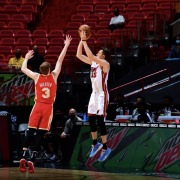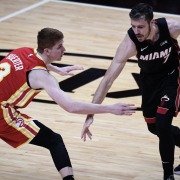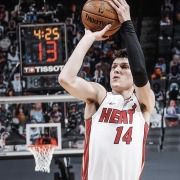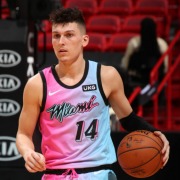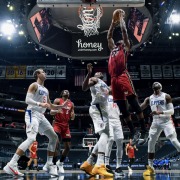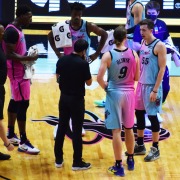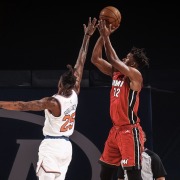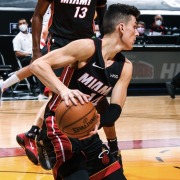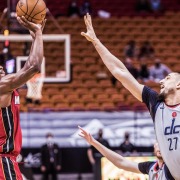5 Takeaways from Heat’s Loss to Hawks
The Miami Heat lost to the Atlanta Hawks this time around, in an absolute nightmare of a game. Erik Spoelstra has discussed playing games in the mud this season, but they played this game in something much worse than mud. Anyway, here are five takeaways from this game…
#1: Miami’s offense no where to be found early.
Well, there’s not much to dive into when discussing the Miami Heat’s offense in the first half, other than shots just not falling. Good looks were being generated throughout beyond the arc, but somehow Miami ended up with 37 points in the first half. The biggest reason for Miami’s offensive struggles was the lack of a guy who can consistently get downhill. Jimmy Butler is usually that guy, but in a game where he was watching from the sideline, that issue became more apparent. This type of offensive play early says a lot about Butler as a player, but it also says a lot about this team. It’s clear they rely on Butler a bit too much at times, since it’s a lot of standing around until he generates offense. Goran Dragic helps that a bit, which was the only type of flow that they had, when he was attacking and kicking.
#2: Bam Adebayo needs to step up amid big time struggles.
When something is going wrong for a team, it’s natural to look toward the best player and leader for that particular night. It was obvious Bam Adebayo wasn’t having his best game in the first half, but 2 shot attempts through 16 minutes of bad basketball should never be the case. As I mentioned previously, dribble penetration and rim pressure was a big issue tonight, which is why setting screens for more pull-up jumpers should be altered a bit. The Clint Capela match-up favors Adebayo from an offensive perspective due to quickness, but that advantage was never really looked to. Butler definitely makes Adebayo’s job a lot easier in most of Miami’s sets, but when Adebayo has to carry a lineup come playoff time when Butler takes a breather, there must be a high amount of trust.
#3: Andre Iguodala may be the only reason things stayed close.
Andre Iguodala is the only guy on the current roster who can replicate some of the things Butler does, mostly from a facilitating perspective. Even though he was directing traffic, shots still weren’t falling, but his continued activity on both ends sparked them in some spurts. That Iguodala-Gabe Vincent tandem continues to impress many on the defensive end, due to both of their extremely aggressive mindsets to get on the ground for loose balls, pick up full-court, and more. A couple stops began to get Miami into transition offense, which seemed to be the only efficient offense early. There’s an immense amount of confidence when Iguodala is running the break, due to his high IQ play-making abilities, which was the only reason Miami trailed by 7 at the half, after a horrific performance early on.
#4: Duncan Robinson sparks third quarter run.
Duncan Robinson found a good time to get free on the perimeter for some three point makes, since it was the spark Miami was waiting for. But it wasn’t just Robinson finding space out of nowhere, he actually generated it himself. He put the ball on the floor a little more to begin the third quarter than he usually would, which was necessary in a game where shots weren’t dropping. Although he wasn’t scoring off the dribble, it gave the defense something to think about, and surprisingly they were thinking about it. Those triples weren’t the traditional dribble hand-off either, since he even utilized some pick and roll sets in which he’d pull up off the dribble. Seeing Robinson have the ability to score in a variety of ways when not being absolutely swarmed, is a healthy reminder after the recent defenses he’s faced.
#5: Tyler Herro finally flips a switch late in the third, but it wasn’t enough.
Tyler Herro stepping up late in the third quarter, after Robinson played a big part early, was all Miami needed to find any type of offense. As I discussed after last game, Herro has an ability to flip an individual switch, leading to increased confidence and more aggression. On a night that he struggled, one shot going in the basket is all it took for him to get back to himself, which led to him straying away from his passive ways early. Those passing abilities made an appearance in the fourth quarter once again after he had a quick scoring run, but that’s when play-making is most effective for him. Herro is not a natural play-maker, he’s a natural scorer. But he can be a trusted facilitator once defenses begin to target his scoring time and time again. Even when he attacked, though, play-making can’t be harped on when the players around him were struggling with uncontested jumpers.
